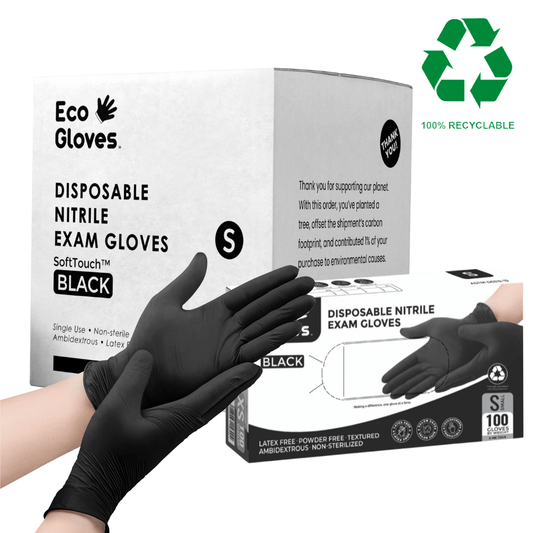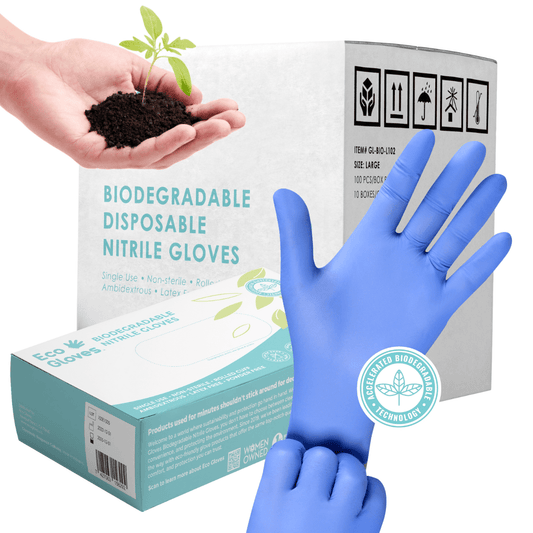Disposable Gloves Manufacturer
Eco Gloves

Looking for a disposable gloves manufacturer? In this article, we're going to educate you on how disposable gloves are made, where you can purchase bulk wholesale disposable gloves, and showcase the differences between nitrile disposable gloves, rubber disposable gloves, polyethylene disposable gloves, and latex disposable gloves.
Disposable gloves are also manufactured for different use cases ranging from medical gloves and restaurant food gloves, to safety gloves and protective gloves.
Topics Covered
- How are Disposable Gloves Manufactured?
- Glove Molds for Manufacturing are made from Ceramic or Aluminum
- How to Manufacture the Highest Quality Gloves
- From Rubber Dip to Vulcanization for Added Strength
- Test Disposable Gloves for Durability & Strength
- Prevent Holes & Leaks in Disposable Gloves
- Add Colors to Disposable Gloves
- How are Vinyl Disposable Gloves Made?
- How are Nitrile Disposable Gloves Made?
- How are Restaurant Polyethylene Disposable Gloves Made?
- Polyethylene Plastic Glove Manufacturing was Popular in the 1960s
- Eco Gloves are a Better Disposable Gloves Solution
- Key Takeaways: Understanding Disposable Gloves Manufacturing
- Frequently Asked Questions About Disposable Gloves Manufacturing
How are Disposable Gloves Manufactured?
In 1890, the development of medical rubber gloves started. At John's Hopkins University, a professional was allergic and therefore protective gloves were made to stop the spread of germs and save lives.
Glove Molds for Manufacturing are made from Ceramic or Aluminum
Disposable gloves need to be made in mass quantities and therefore molds are used. Molds are cleaned in soapy water, and bleached to remove every spec of residue. A single spec of residue can cause holes which cause defects.
How to Manufacture the Highest Quality Gloves
To ensure the highest quality level of disposable glove manufacturing, you need to keep a clean environment, and also ensure best practices are used throughout the entire process. This includes everything from the scrubbing of the molds, to being dipped into hot water. They are then dripped dry.
From Rubber Dip to Vulcanization for Added Strength
While there are many processes, the main include dipping the gloves into rubber, and then passing through a curing process known as vulcanization. This ensures the strongest rubber for your disposable gloves, and to prevent holes or ripping. The cuff roll for gloves make it easier to pull the glove off the mold. Rubber is preferred to latex to prevent allergies.
Test Disposable Gloves for Durability & Strength
Top glove manufacturers typically test each glove to ensure there are no gloves and do not rip easily. A test is also done to ensure there is no liquid leaks.
Prevent Holes & Leaks in Disposable Gloves
Top glove manufacturers typically test each glove to ensure there are no holes and do not rip easily. A test is also done to ensure there are no liquid leaks known as AQL or acceptable quality level.
Add Colors to Disposable Gloves
Disposable gloves are color coded differently to indicate their purpose and use case in different situations. Blue, pink, natural, yellow, orange, and purple are the most popular colors.

How are Vinyl Disposable Gloves Made?

How are Nitrile Disposable Gloves Made?
Nitrile is a form of rubber, and it's full name is nitrile butadiene rubber, technically classifying it as a type of latex, but without the allergic skin reactions.
Nitrile Butadiene Rubber is made by combining monomers such as butadiene and acrylonitrile in a chemical reaction known as polymerization to create liquid nitrile.

Nitrile is the preferred choice by the medical industry because of it's durability and protection against chemicals, safety towards patients and staff with latex allergies, and also the fact that Nitrile can be recycled whereas latex gloves cannot.
How are Restaurant Polyethylene Disposable Gloves Made?
Restaurants and food service businesses can go through hundreds of thousands of gloves per year at a single location, and therefore, costs are a big concern. The problem is that the effects of single use plastics when trying to reduce costs is harming the environment and polluting landfills or ocean ways that can take 500+ years to degrade.
Polyethylene or plastic gloves are made by taking two sheets and sealing them with heat to create disposable gloves. This is different than how latex, nitrile, and vinyl gloves are made.
Watch the video about how PE gloves are made.
Polyethylene Plastic Glove Manufacturing was Popular in the 1960s
In the 1960's, plastics such as polyethylene gloves became popular because they were single use, and could be cheaply manufactured in mass quantities. Over 60% of the environmental impact of plastic bags is due to the extraction of raw materials, 25% is due to production, 10% due to transportation, and 5% at the end of life. The USA uses over 100 billion plastic bags, and very little actually gets recycled. The majority make its way into ocean waterways where it takes over 500 years to degrade into micro plastics which can be fatal to marine life.
Big companies are responsible for 71% of the carbon emissions of the world.
Eco Gloves are a Better Disposable Gloves Solution
Looking to help the earth go eco-friendly and minimize the waste created by disposable gloves? Learn more, and buy Eco Gloves.

Using disposable gloves have a massive environmental impact on the earth, and the world we live in today. The use of disposable gloves are often so easy that we overlook the damage that they cause today.
Far too many companies are choosing simply saving on costs, rather than the long term effects of the damage being done to the environment. There are alternatives such as Eco Gloves Disposable Gloves.
Contact our Disposable Glove Manufacturer
While disposable gloves are a crucial part of business operations around the world, these companies need to understand how disposable gloves are made, the sourcing of the raw materials, and also the end life of how they are ultimately purposed and recycled.
If you're looking for an eco-friendly disposable glove alternative to current disposable gloves, check out Eco Gloves; they’re compostable and biodegradable, so you can minimize your carbon footprint. See how eco gloves can solve your disposable glove problem, one disposable glove at a time.
Key Takeaways: Understanding Disposable Gloves Manufacturing
- Disposable gloves are produced in large-scale facilities using ceramic or aluminum molds that are meticulously cleaned to prevent defects.
- The main materials for gloves—latex, nitrile, vinyl (PVC), and polyethylene—each have unique benefits, manufacturing processes, and ideal use cases.
-
Latex gloves offer high tactile sensitivity but can trigger allergic reactions, leading many industries to seek alternatives.
-
Nitrile gloves are durable, chemical-resistant, latex-free, and recyclable, making them the preferred choice for medical and industrial use.
-
Vinyl gloves are cost-effective and commonly used in healthcare and food service, though they offer less durability than nitrile or latex.
-
Polyethylene gloves are inexpensive and easy to mass-produce, but have significant environmental drawbacks due to their long degradation time.
- Testing methods such as AQL (acceptable quality level) ensure gloves are free from holes and defects before distribution.
- Color-coded gloves (blue, pink, natural, yellow, orange, purple) help indicate specific uses in various industries.
- Eco Gloves provides compostable and biodegradable options that reduce the environmental impact of disposable gloves without compromising performance.
👉 Partner with Eco Gloves for responsibly made, sustainable glove solutions that meet your performance needs while minimizing your carbon footprint.
Frequently Asked Questions About Disposable Gloves Manufacturing
-
What materials are commonly used to manufacture disposable gloves?
The most common materials are latex, nitrile, vinyl (PVC), and polyethylene. Each has different strengths, costs, and applications.
-
How are nitrile gloves made?
Nitrile gloves are created from nitrile butadiene rubber, made by polymerizing butadiene and acrylonitrile. The liquid nitrile is formed over molds, cured through vulcanization, and finished for strength and durability.
-
Why are nitrile gloves preferred in the medical industry?
They are puncture-resistant, chemical-resistant, latex-free, and provide strong protection against pathogens, making them safe for both patients and healthcare workers.
-
What is AQL testing in glove manufacturing?
AQL (acceptable quality level) testing ensures that gloves meet strict standards for safety and performance by checking for holes, tears, and liquid leaks.
-
Are polyethylene gloves environmentally friendly?
No. Polyethylene gloves take over 500 years to break down and contribute to plastic pollution, which is why eco-friendly alternatives like compostable gloves are recommended.
Related Reading
- How to Choose the Best Disposable Gloves for Cleaning
- Disposable Gloves For Industrial Use: Protecting Workers From Hazards
- The Ultimate Buyer's Guide to Eco-Friendly Gloves: Selecting the Best Sustainable Disposable Gloves in 2024














